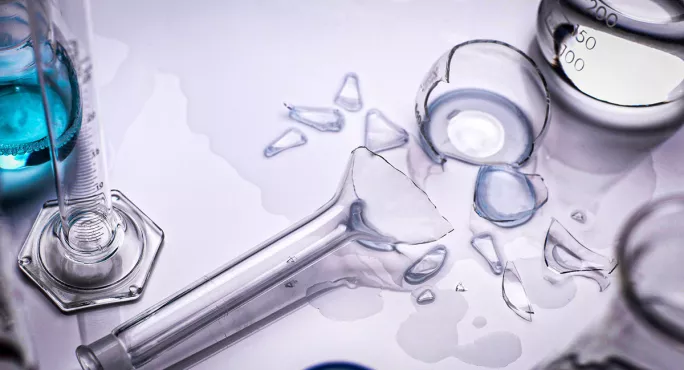‘Struggling’ science teachers can’t afford to run practical lessons

The next government must provide enough funding for science practical equipment and chemicals, a chemistry body has said as more schools are being forced to apply for extra funding to afford equipment.
Many schools cannot afford to replace the chemicals and equipment needed to run science practical work, the Royal Society of Chemistry (RSC) told Tes.
Aylin Ozkan, policy specialist for the RSC and science teacher, said: “Teachers always tell us that there’s a lack of time within the curriculum to be running practical work. And there are funding issues all the time.
“I recently spoke to teachers who were telling me the cost of ethanol has gone up so much they can’t afford it.
“Science technicians tell us that when equipment breaks, they can’t afford to replace it and students end up working in larger groups.”
Applications double for deprived school funding
The RSC’s Elevating Chemistry fund provides cash for deprived schools to support chemistry attainment. The average funding request for equipment and chemicals to the fund was around £1,300 in May 2024, up from £660 in May 2022.
There have been more than double the number of applications to the fund (51) in 2024 compared with 2022 (19).
Responding to the RSC’s Science Teaching Survey 2023, a technician said more funding would have the most impact on science teaching.
“We are really struggling to retain staff who move into the private sector for higher wages,” the technician said.
“And our budget is cut year after year and we are unable to run the practicals we would like to outside of those required because we cannot afford to replace chemicals or maintain equipment.”
- GCSE science: Sharp fall in ‘crucial’ practical work
- Science resources: ‘Outdated’ facilities are harming learning, warn teachers
- Stem: Calls for ‘ambitious’ new strategy to tackle teacher shortage
In the 2023 survey, 57 per cent of science teachers who responded said inadequate funding was an issue, while more than two-thirds (67 per cent) said more funding was needed.
The RSC is calling on the next government to take action to ensure schools are able to provide sufficient access to practical science work.
“Practical experiments are important in bringing the science curriculum to life for students, but many schools continue to face severe funding challenges, and in some cases, this is affecting the breadth of curriculum on offer and the resources available for teaching and staffing,” said Sarah Hannafin, head of policy at the NAHT school leaders’ union.
Call for protected time in the curriculum
This comes after the Royal Society’s Science Education Tracker found only 26 per cent of Year 10 and 11 students reported being able to do experiments at least once a fortnight in 2023 - down significantly from 44 per cent in 2016.
The RSC is calling for sufficient time protected within the curriculum to run practical science, as well as sufficient funding for equipment and technicians to help run experiments.
It has also said teachers, including non-specialists who cover science lessons, should have access to CPD opportunities to increase confidence in delivering experiments.
Ms Ozkan added that building time for experiments into the science curriculum would need to start from the point of curriculum reform. The NAHT also said it would like to see all parties commit to reviewing the curriculum.
Nearly three-quarters of teachers (73 per cent) responding to the RSC’s survey said the amount of content in the science curriculum is currently too much.
Shortfall in science teachers
There were 774 entrants to initial teacher training in chemistry for 2023-24. This was only 65 per cent of the 1,195 target.
As of data released in March, the Department for Education is projected to under-recruit trainee teachers for 2024-25 in some science, technology, engineering and maths (Stem) subjects - including chemistry, physics and maths.
“We’ve seen such a massive recruitment and retention crisis over recent years and a lack of Stem teachers - so it’s really important that CPD is available to everybody and teachers have time to do it,” Ms Ozkan said.
Pepe Di’Iasio, general secretary of the Association of School and College Leaders, said: “It is clear that this is yet another area that is hit by the insufficiency of government funding for education.
“Government policies have resulted in pay erosion and budget cuts that mean schools cannot remotely compete with the private sector in terms of salaries, so staff retention is a huge problem.
“Clearly budgets for practical activities will be constrained, too.”
The Conservatives, Labour and the Liberal Democrats were contacted for comment.
For the latest education news and analysis delivered directly to your inbox every weekday morning, sign up to the Tes Daily newsletter
You need a Tes subscription to read this article
Subscribe now to read this article and get other subscriber-only content:
- Unlimited access to all Tes magazine content
- Exclusive subscriber-only stories
- Award-winning email newsletters
Already a subscriber? Log in
You need a subscription to read this article
Subscribe now to read this article and get other subscriber-only content, including:
- Unlimited access to all Tes magazine content
- Exclusive subscriber-only stories
- Award-winning email newsletters
topics in this article



